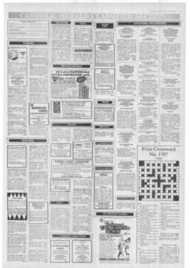Page 7, 11th February 1983
Page 7

Report an error
Noticed an error on this page?If you've noticed an error in this article please click here to report it.
Tags
Share
Related articles
A Triumphant Portrait Of Gandhi
Building Up A Chronicle Of The Growth Of Film-making
Attenborough Triumph
Dumbo Meets His Match?
Richmond Civil Rights Festival
Richard Attenborough's quest for Mahatma Gandhi
In search of Gandhi by Richard Attenborough (The Bodley Head £9.95p) RICHARD Attenborough's film, Gandhi is an outstanding achievement. Sweeping the decks of the prestigious New York critics' awards, it won those for best picture, best director, best producer and best actor. (Ben Kingsley won two awards for this last).
It is notable because only the rare producer, director and still rarer star scores such a double triumph at once:a world box office hit and a vehicle for his own cherished dream.
In Search of Gandhi is as much about Richard Attenborough as Mahatma Gandhi,.which is fair enough.
For the story of Attenborough's quest for Gandhi is lavishly illustrated with stills almost counterpointing the personal story with the latter's family snapshots and endearing photographs of three little blond Attenborough boys.
I like the story of nursery commercial enterprise in which David, aged about ten, agreed to participate only if his share of the profits went to the RSPCA. Photo-portrait of their handsome father, "The Governor" (Principal of University College, Leicester) and mother fill in the Attenborough family background of typical English moderation, the Lib-Lab benevolence of men of goodwill.
Attenborough admits that he knew "nothing about India and less about Gandhi" in 1962 when a mysterious and insistent visitor called. He was Motile] Kothari who had left India after Gandhi's assassination and came to join the London staff of the Indian High Commission. He now came to try to interest Attenborough in making a film about Gandhi and his lifework.
So the operation had to start from scratch. The gist of the book is the story of the actordirector's persevering to overcome all obstacles, economic, technical, political or logistic.
In his personal story he laments his eventual abandonment of Labour for the SDP; while on the film there was widefelt disappointment over Alec Guinness's refusal to play Gandhi, a disappointment surely overcome by Ben Kingsley's total triumph in the role.
The background also explains the author's rather trendy acceptance of "the end of the British Empire as we knew it" as one of Gandhi's heroic deeds.
My own reservations about this attitude I made plain in my review of the movie. Attenborough answers such criticism convincingly enough when he pleads: "I was not telling the story of the Congress Party, not even the story of Indian independence, but the spirit of one man".
Of that he has made a brilliant accomplishment even if it is a highly coloured biopic not a portrait in depth or a serious history.
He has also made a triumph of the other story; the progress of the young actor in the small part of the frightened sailor in In Which We Serve where he first met Lord Mountbatten whose photograph as Viceroy figures often in the book, to the role of the boy gangster Pinkie in Brighton Rock and on to his first articulate film production, Angry Silence and participation in that other early
satire of trade unions by the Boulting Brothers starring Peter Sellers, I'm All Right, Jack.
Last came the more creative success of Oh What a Lovely War (much as I disliked some of it). Praise for the two trade union pictures provokes Attenborough's response: It was no attack on organised labour; it was an attack on bully-boys and on the lunatic, far-left fringe of the trade union and labour movements. Those are the very qualities critics of the unions do attack. They are also shown up by the Attenborough background of English decency and moderation which fired the author's quest for Gandhi in film and book.
Freda Bruce Lockhart
blog comments powered by Disqus











